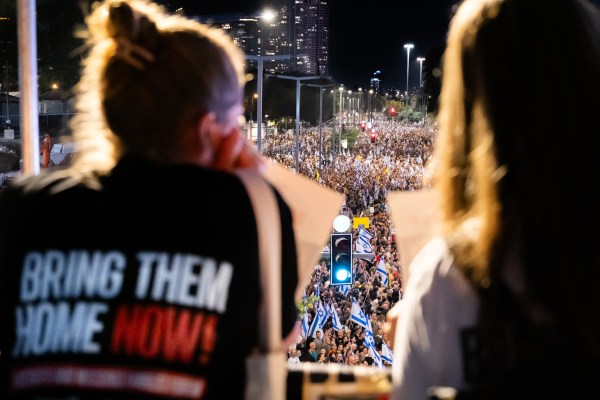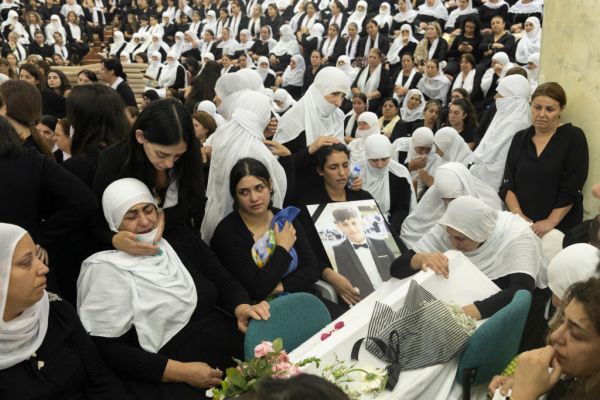Happy Friday! We’d like to give a shoutout to Isaac Frye, the random guy who may not be the odds-on favorite to win the National League Rookie of the Year award but, due to a printing error, is featured on the baseball card of the guy who is.
San Diego Padres outfielder Jackson Merrill prospect was excited to receive his first professional baseball cards—until he opened up the box. “All the stats were right, name right, everything right,” Merrill told The Athletic. “And then the picture wasn’t me.”
Quick Hits: Today’s Top Stories
- The Israel Police and Shin Bet—one of the nation’s security agencies—said on Thursday they had uncovered and thwarted plots by an Israeli citizen working in conjunction with Iranian intelligence agents to commit terrorist attacks in Israel, including assassinating Prime Minister Benjamin Netanyahu, Defense Minister Yoav Gallant, and former Prime Minister Naftali Bennett. The 73-year-old Israeli suspect—detained by Israeli authorities last month and indicted in court on Thursday—was allegedly smuggled into Iran on two separate occasions in which, according to Israel Police, he met with an Iranian official and offered to collect intelligence information and complete missions in Israel on behalf of Tehran in exchange for money.
- The Israel Defense Forces (IDF) announced on Thursday that two IDF soldiers died in a Hezbollah strike on northern Israel earlier in the day. Hezbollah and Israel have exchanged cross-border fire this week amid escalating tensions after an alleged Israeli attack on Hezbollah’s communications systems that killed more than 30 people over two days this week and which Hezbollah leader Hassan Nasrallah called a “declaration of war.” Overnight on Thursday, the IDF said Israeli fighter jets targeted and attacked some 100 projectile launchers, an ammunition warehouse, and other Hezbollah military infrastructure in southern Lebanon.
- Saudi Arabian Crown Prince Mohammed bin Salman said Wednesday that the country will not green-light diplomatic relations with Israel until an independent Palestinian state—with a capital in East Jerusalem—is established. Prior to Hamas’ October 7 attack on southern Israel, the U.S. had brokered negotiations between Israel and Saudi Arabia aimed at opening diplomatic ties between the two countries, though the attack threw the negotiations—which were part of larger negotiations to strengthen U.S.-Saudi ties—into uncertainty.
- Venezuelan opposition candidate Edmundo González claimed on Wednesday that two senior government officials coerced him into signing a document conceding he lost the election while he sheltered in the Spanish ambassador’s residence in Caracas, Venezuela. The U.S. had previously declared González—who has since fled to Spain—the rightful winner of the country’s July presidential elections, despite Venezuelan dictator Nicolás Maduro claiming victory and remaining in power. “Either I signed or I faced the consequences,” González said Thursday, adding the document is meaningless because he signed it under duress. One of the two officials who allegedly coerced and threatened the opposition candidate, Venezuelan National Assembly President Jorge Rodríguez, warned that if González did not retract his statement within 24 hours, he would release unspecified audio recordings. Meanwhile, Spanish Foreign Minister José Manuel Albares said on Thursday that he did not invite anyone to visit González, nor was he involved in any negotiations related to the document.
- The U.S. Treasury Department on Thursday imposed new sanctions on one person and five entities that it alleges facilitated payments between North Korea and Russia to help the two countries avoid international sanctions. The U.S. State Department said that the “illicit networks” supporting the payments were bolstering both North Korea’s nuclear and ballistic missile program and Russia’s war in Ukraine.
- A new Federal Trade Commission (FTC) study released on Thursday alleged that several major social media platforms and video streaming companies placed their users under “vast surveillance”—beyond what users may expect, FTC staff said—to monetize their online personal information. The report, which examined nine companies, including Meta, YouTube, X, and TikTok, claims that the sites failed to provide sufficient safety measures for their users, particularly children and teens. The findings are based on four years of examining information about the companies’ practices that the FTC compelled them to turn over in 2020.
- The Justice Department announced on Thursday that a 76-year-old Alaska resident had been arrested and indicted for threatening violence—including torture and assassination—against six U.S Supreme Court justices and their families. During a four-month span in 2023, prosecutors allege, the suspect sent 465 messages to the Supreme Court through a public website, including threats of violence, as well as racist and homophobic remarks. He was arrested Wednesday in Anchorage, Alaska, and indicted on 22 federal criminal charges.
Israel’s Northern Front Heats Up

In a series of events that would feel like the opening of an implausible spy thriller if they weren’t true, thousands of Hezbollah operatives checked their pagers—yes, pagers—on Tuesday at around 3:30 p.m. local time in Lebanon, expecting to see a message from the Iran-backed terrorist organization’s leadership. Instead, within minutes, the devices exploded almost simultaneously in what U.S. officials have confirmed was a carefully devised Israeli attack on the group that has bedeviled Israel’s northern border with Lebanon.
The explosions came a day after the Israeli government deemed returning displaced residents of northern Israel to their homes a specific war aim—a pivot that followed nearly a year of evacuations due to ongoing Hezbollah attacks. As Hezbollah leader Hassan Nasrallah declared on Thursday that Israel “crossed all rules and red lines” with the pager attack, Israeli fighter jets continued to target terrorist infrastructure across Lebanon throughout the day and overnight.
Twelve people were killed in Tuesday’s blasts in Lebanon, and thousands were injured, but, in an even more outlandish twist, the carnage wasn’t over: On Wednesday afternoon, Hezbollah walkie-talkies blew up simultaneously in cities across the country, killing twenty people and wounding hundreds.
So how did Israeli intelligence—as U.S. officials have confirmed it was, though the Israeli government has only glancingly acknowledged the twin attacks—conduct this daring and intensely targeted strike in broad daylight, against thousands of terrorist operatives embedded in Lebanese society? It played the long game. “Israel prepared for a war in the North,” said Israeli journalist Nadav Eyal, on Dan Senor’s “Call Me Back” podcast on Wednesday, describing Israel after the 2006 war with Lebanon. “It prepared itself [for] a war with Hezbollah.”
Israel has long seen the Lebanese terror group—which boasts a well-trained fighting force of some 100,000 soldiers and an arsenal of more than 200,000 rockets, precision-guided missiles, and drones—as a major strategic threat. Accordingly, it’s spent the better part of the last decade collecting intelligence in preparation for an eventual conflict with its northern neighbor.
Nasrallah has increasingly insisted on low-tech communications systems—including pagers—amid Israel’s successful targeting of terrorist leaders by pinpointing cell signals.
Israeli intelligence, anticipating a need, set up a shell company ostensibly based in Hungary to supply Hezbollah with all its low-tech needs, the New York Times reported. The company fulfilled legitimate orders from non-terrorists, but the batteries of the pagers it sent to Hezbollah—as early as 2022—were fitted with a special component: explosives. Reuters reported that the devices involved in the second round of explosions—mostly walkie-talkies intended to be used during a war with Israel—were purchased five months ago along with the bulk of the pagers.
The attack has already had the effect of sowing distrust in Hezbollah’s communications technology and security protocols. “Israel has, and still has, a lot of surprises in store for Hezbollah. And this is something that Hezbollah started to learn during [the 2006 war] and now they just got another surprise,” Eyal said. “If you get these kinds of abilities to infiltrate your enemy, it doesn’t end with pagers, necessarily.”
Iranian Ambassador to Lebanon Mojtaba Amani was reportedly among those close enough to one of the exploding pagers to be injured in the first wave.
Though some civilians were reportedly among the casualties—including the child of a Hezbollah terrorist who was reportedly delivering the pager to her father when it exploded—the mass simultaneous explosion remains a feat of fair-game sabotage. “From a law of war standpoint, Israel’s pager bombs represent one of the most precisely targeted strikes in the history of warfare,” our old friend David French said. “I can’t think of a single widespread strike on an armed force that’s embedded in a civilian population that’s been more precise. It’s remarkable.”
The attacks followed an Israeli security cabinet meeting late Monday, during which the government formally added returning evacuated northern residents to their homes to the list of war aims in the country’s ongoing conflict against Iranian proxies. As Charlotte reported this week, tens of thousands of civilians remain displaced as Hezbollah attacks on northern Israel persist and intensify:
In the border region of northern Israel, even coordinating civil services like firefighting can pose an intolerable risk to municipal workers, who must brave both the blaze and the threat of repeat rocket attacks by Hezbollah, the Iranian-backed militia group whose strikes since October 8 have emptied out large swaths of land near the border with Lebanon.
And the evacuated zone, which includes communities within roughly 2 miles of the border, isn’t the only part of northern Israel under threat. As Hezbollah keeps some 60,000 Israelis from their homes through continued bombardment, it also fires on populated areas south of the emptied-out towns and cities.
Earlier this summer, a Hezbollah rocket struck a soccer pitch in a Druze community in the Golan Heights, killing a dozen children and prompting Israel to assassinate Hezbollah military leader Fuad Shukr in retaliation. Shukr was among the dozens of Hezbollah commanders and hundreds of fighters Israel’s air force has killed since the terror group began firing on the north, but the simmering conflict has thus far stopped short of erupting into a broader war. That could soon change, Israeli officials are signaling, as domestic pressure mounts to restore security in the evacuated north.
“We are at the start of a new phase in the war,” Defense Secretary Yoav Gallant said Wednesday. “We are allocating resources and forces to the northern arena and our mission is clear: ensuring the safe return of Israel’s northern communities to their homes. To do so, the security situation must be changed.”
Over the course of the week, Israeli military movements have begun to reflect that shift in purpose. On Wednesday, an additional Israel Defense Forces (IDF) division—between 10,000 and 20,000 soldiers—was sent to the border. On Thursday, IDF Chief of Staff Lt. Gen. Herzi Halevi approved battle plans for the northern front as the IDF announced that two soldiers had been killed in Hezbollah strikes on the Western Galilee.
With tensions ramping up, Nasrallah, the Hezbollah chief, on Thursday delivered a saber-rattling speech in which he called the tech bombings “an unprecedented and historic blow” to the terrorist organization and “a declaration of war.” As he was speaking, a sonic boom of Israeli jets could be heard over Beirut.
Overnight on Thursday, Israel carried out strikes on more than 100 loaded Hezbollah launchers and 1,000 rockets across southern Lebanon. Though not the first large airstrike on Hezbollah targets in recent months—Israel foiled a massive Hezbollah launch intended as revenge for the assassination of Shukr—it is another indication of just how close Israel is to full-scale war with Hezbollah.
Western leaders urged restraint this week, suggesting that the pager bombings threatened to sink the ever-ongoing ceasefire-for-hostage release talks—which had been seen as a bulwark in themselves against escalation on the northern front. “France and the United States are united in calling for restraint and urging de-escalation when it comes to the Middle East in general and when it comes to Lebanon in particular,” Blinken said Thursday after meeting with his French counterpart in Paris. “But meanwhile, we don’t want to see any escalatory actions by any party that make [achieving a ceasefire deal] even more difficult.”
Just hours later, the Wall Street Journal reported that many senior administration officials privately feel the parties are unlikely to reach a deal before the end of President Joe Biden’s term in January because Hamas makes demands only to refuse to accede to a deal when Israel and the U.S. agree to the terms. “No deal is imminent,” a U.S. official told The Journal. “I’m not sure it ever gets done.”
Even as Israel shifts some of its focus away from the war in Gaza against Hamas, Israeli officials have maintained that war in the south isn’t over. “We have not forgotten the hostages and we have not forgotten our tasks in the south,” Gallant said. “This is our duty and we are performing it at the same time.”
Worth Your Time
- Reporting from civil war-torn Sudan, the New York Times’ Nicholas Kristof wrote of the destruction and horrid conditions Sudanese villagers have faced. “When an Arab militia rampaged through Maryam Suleiman’s village in the Darfur region of Sudan last year and lined up men and boys to massacre, the gunmen were blunt about their purpose,” he wrote. “‘We don’t want to see any Black people,’ a militia leader said, adding mockingly: ‘We don’t even want to see black trash bags.’ To make his point, Maryam recalled, he shot a donkey because it was black. … The atrocities underway near here are an echo of the Darfur genocide of two decades ago, with the additional complication of famine.” Kristof recalled his interactions with a 17-year-old orphaned girl: “‘When there isn’t enough food, I give it to my sisters and brother,” she told me. … ‘I’d rather my sisters and brother eat, because they cry when they go hungry,’ she said. ‘And I can’t bear to hear them cry.’”
- In the Wall Street Journal, Joe Parkinson and Drew Hinshaw reported on two children who discovered their parents—exchanged as part of the prisoner swap that freed reporter Evan Gershkovich from Russian captivity—were Russian spies. “‘Ludwig’ and ‘Maria’ had suffered an abrupt end to their clandestine careers, arrested just after finishing breakfast in their suburban home and outed as deep-cover spies for Moscow,” Parkinson and Hinshaw wrote. “How to break it to the kids? Please, they’d quietly pleaded with their Slovenian escorts, don’t address us by our real names. They hadn’t yet told their son and daughter, touring the cockpit, that they were Russian. … Their children, 9-year-old Daniel and 11-year-old Sophie, knew their mom and dad as Argentine citizens named Ludwig Gisch and Maria Mayer Muños. What they didn’t know is that their family was a carefully constructed lie. … Even after they were caught and jailed for espionage, the couple still hadn’t told their children that Spanish—the family’s language—was a second tongue, learned to fluency for a secret assignment meant to last until the siblings came of age and could hopefully be recruited to follow in their footsteps.”
Presented Without Comment
CNN: ‘I’m a Black NAZI!’: NC GOP Nominee for Governor Made Dozens of Disturbing Comments on Porn Forum
Also Presented Without Comment
Vice President Kamala Harris, speaking to Oprah Winfrey:
If somebody breaks in my house, they’re getting shot. I probably should not have said that. My staff will deal with that later.
Also Also Presented Without Comment
BBC: New York Teen Accused Of Taking Subway Train And Crashing It
In the Zeitgeist
This edition of In the Zeitgeist goes out to Declan and our colleague Alex Demas: Bon Iver has a new song out that we are sure we’ll be hearing around Dispatch HQ next week.
Toeing the Company Line
- In the newsletters: The Dispatch Politics team reported on the revamp of the Trump campaign’s legal operations amid new electoral integrity lawsuits, Scott explained why (🔒) government subsidies often fail to produce their intended results, Nick argued (🔒) that debates might actually matter this cycle, and Will panned an outdated environmental protection law that stymies innovation.
- On the podcasts: Sarah is joined by Steve, Mike, and former Democratic Sen. Heidi Heitkamp on The Dispatch Podcast roundtable to discuss political violence and the state of the race.
- On the site: Kevin notes that Wall Street is trending more and more capital-D Democratic, and summer intern Grant Lefelar profiles Marty Kotis, a University of North Carolina trustee in the middle of fights over affirmative action and DEI.
Let Us Know
Do you think there will be a full-scale war between Israel and Hezbollah? Or has it already begun? If so, how should the U.S. respond?









Please note that we at The Dispatch hold ourselves, our work, and our commenters to a higher standard than other places on the internet. We welcome comments that foster genuine debate or discussion—including comments critical of us or our work—but responses that include ad hominem attacks on fellow Dispatch members or are intended to stoke fear and anger may be moderated.
With your membership, you only have the ability to comment on The Morning Dispatch articles. Consider upgrading to join the conversation everywhere.